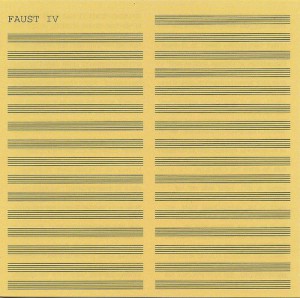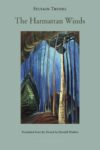I was first introduced to Krautrock by a homeless guy in Frankfurt. How we met and why we were hanging out is too convoluted a story for a relatively short blog post, so I’ll stick to the relevant details of our conversation and say he was bragging about experimental German bands he had met in the 1970s: Neu!, Cluster, Faust, CAN, Tangerine Dream, Kraftwerk. I understood through context that he was bragging, but I hadn’t heard of any of the bands he was talking about. Maybe Kraftwerk?
Most of the music I was listening to at the time was the equivalent of comfort food. It was aesthetic succor for the nervousness I felt about my impending deployment to Iraq. I wasn’t ready, just yet, to cut the psychic tether keeping me in the orbit of my home. So the music I listened to used blues scales and accoustic guitars, and was recorded in studios so famous that there are Broadway musicals about them. Music in which you can anticipate the chord changes. Music that your parents understand. Music that shows up on the iPod playlists of your scoutmaster, accountant, and youth minister. Last year I heard “Vitamin C” by CAN and it changed my life.
If saying that a song changed my life is too cliché a hyperbole, then allow me at least the claim that it changed the way I listen to music. CAN is psychedelia that makes The Doors sound like children’s music (it is). Kraftwerk are as influential as The Beatles. Neu! aren’t rock n’ roll at all, and better for it. Cluster, pioneers of ambient drone, are about as “far out” as I can go. If you really want to understand the origins of this music you have to keep two things in mind: 1) The only thing, and the most important thing, that all Krautrock bands have in common is that they draw from the European avant-garde tradition from Wagner to Stockhausen 2) There’s a political consciousness permeating all of this that has to do with starting over and rebuilding a war-decimated Germany from scratch. Brick-by-brick and sound-by-sound. And if those two things seem to contradict each other, then you’ve stumbled upon the enigma that gives the music its mysterious power. It all sounds primeval and hyper-modern at the same time.
The best documentary about Krautrock that I’ve seen is this BBC 4 special. Watch it! The best book I’ve read about it is Krautrock: Cosmic Rock And Its Legacy. Read it! They’re great introductions. And if you’re already acquainted and want to go deeper, let me recommend this and this. I wasn’t ready in Frankfurt for what the homeless guy was telling me, but now, assuming he wasn’t lying, I’m impressed. I feel like it’s the same way with the music itself. The public wasn’t really receptive to Krautrock when it was being made (Kraftwerk is the exception), but I think if those same people were to listen now, they would recognize the drone, repetition, minimalism, and electronica for what it is — the origin of the most interesting and powerful attributes of modern music.
This post may contain affiliate links.








